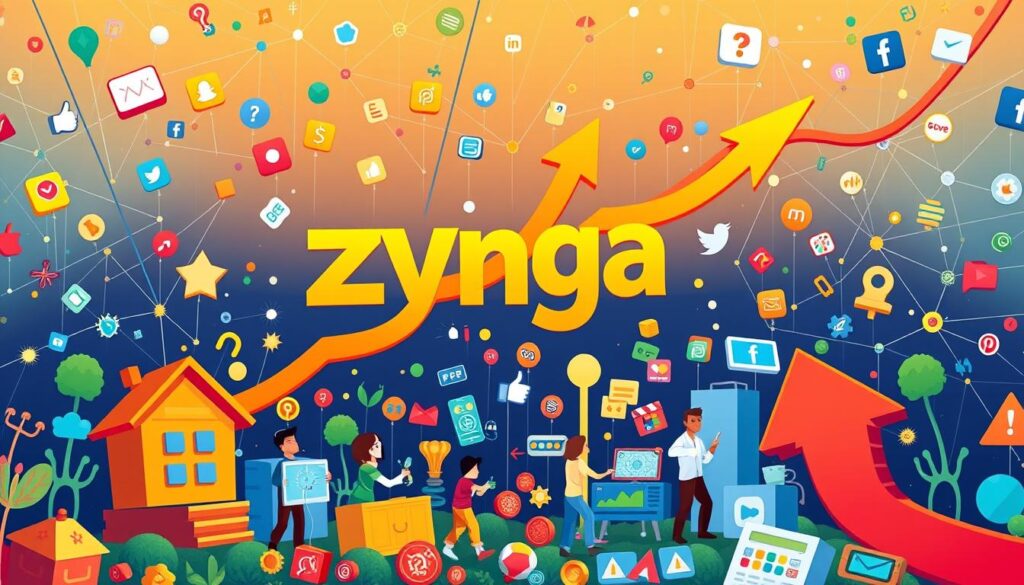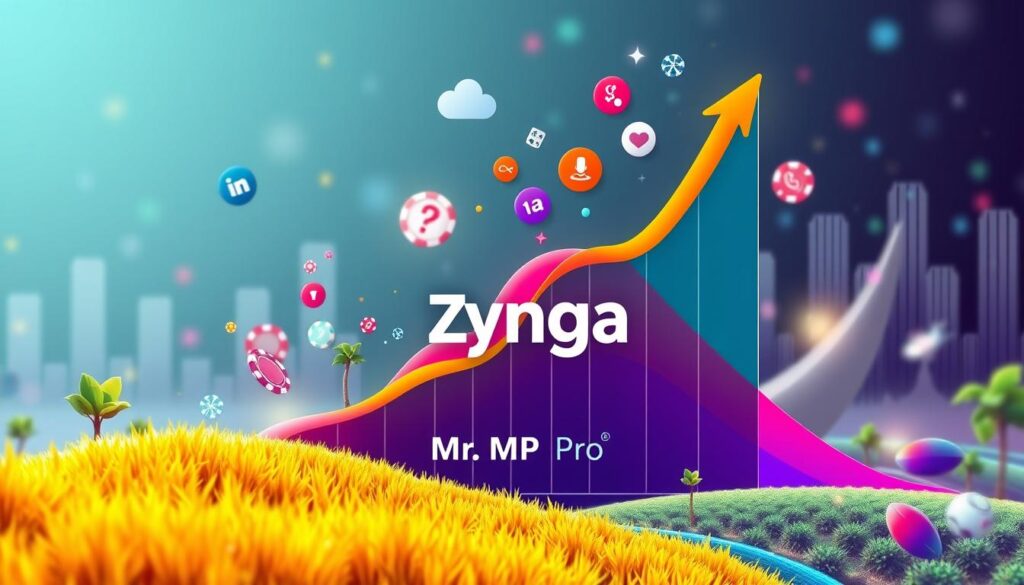
Zynga’s story is both fascinating and cautionary. The company’s stock decline is a lesson for the gaming world. Zynga’s Farmville quickly became a hit, attracting over 1 million users daily. It made nearly $30 million in its first six months and $235 million in its first year.
This success was just the start for Zynga. But, the company’s downfall is a complex tale. It involves understanding what led to both its rise and fall.
Zynga once dominated Facebook gaming with hits like Farmville. But, it lost its edge due to too many games, too much reliance on Facebook, and user boredom. The zynga stock decline is a key part of this story. It shows how important it is to keep up with market changes.
Today, Zynga’s future is uncertain. Its revenue is expected to reach $336.5 million in Q1 2020. The Fall of Zynga remains a topic of interest for industry experts.
The Birth of a Gaming Giant
Zynga started in 2007, when Mark Pincus spotted a chance in the gaming world. He knew adults wanted games that fit their busy lives. This idea led to games that were easy to play, social, and valuable for adults.
As Zynga grew, it faced tough times like zynga ceo resignation and zynga financial crisis. These issues hurt its zynga market share loss.
The company’s early wins came from its smart move to partner with Facebook. Games like FarmVille quickly became hits. FarmVille, for example, hit 10 million daily players in just six weeks. This showed Zynga’s knack for making games that people loved and played together.
Think about your favorite mobile game and why you like it. Is it the fun, the challenge, or something else? Share your thoughts and let’s dive into the world of mobile gaming together.
| Game | Launch Date | Daily Active Users |
|---|---|---|
| FarmVille | June 2009 | 10 million |
| CityVille | December 2010 | 16 million |
Understanding Zynga’s Meteoric Rise
Zynga’s success came from making games that people loved and played on Facebook. Games like CityVille and Farmville were huge hits. CityVille even beat Farmville in daily players.
Zynga’s games were among the top on Facebook. This shows how well they connected with players.
The company made money by letting players play for free. But, this made it hard to keep making money if players didn’t spend enough. To fix this, Zynga spent a lot on new ideas and changing how it worked.
Some things helped Zynga do well:
- Working well with Facebook
- Making games that were fun and hard to stop playing
- Using social media to get more players and market games
But, Zynga also faced problems. It saw a zynga revenue drop and had to change how it worked. The company also had to lay off some employees to stay competitive. Yet, Zynga’s story teaches us a lot about the gaming world.

The Facebook Gaming Revolution
Facebook was key in Zynga’s success in social gaming. The introduction of Facebook Credits changed Zynga’s revenue and growth. Zynga’s management and profile were closely linked to Facebook’s changes.
Zynga’s games were huge hits thanks to their viral growth and user acquisition. FarmVille, launched in 2009, reached millions of players. It showed how important social interaction is in gaming, with many playing because of friend invites.
Here are some key factors that contributed to the Facebook gaming revolution:
- Increased user engagement through games from 2008 to 2013
- The rise of mobile gaming, which shifted users from Facebook’s platform
- Changes in Facebook’s algorithms, reducing organic reach for game developers
The zynga stock performance was also impacted by these changes. As the company adapted, it made big changes in management. Knowing Zynga’s company profile and evolution helps understand its impact on gaming.

Peak Performance Years: 2009-2011
Zynga’s zynga market dominance was clear from 2009 to 2011. The company’s zynga online gaming success came from hits like Farmville. It quickly gained 1 million users in just 4 days.
Farmville’s popularity soared, reaching 75 million users in 9 months. At its peak, it had 83 million monthly players.
Zynga’s financial success was also notable. It made up 19% of Facebook’s revenue at its peak. The company’s IPO in 2011 raised $1 billion, valuing it at $7 billion. This marked a significant milestone for Zynga, with zynga future prospects looking bright.
Some key statistics from Zynga’s success include:
- Farmville’s user base grew to 75 million users within 9 months
- At its peak, Farmville had 83 million monthly users
- Zynga accounted for 19% of Facebook’s revenue
- Zynga’s IPO in 2011 raised $1 billion, with the company valued at $7 billion
The Fall of Zynga: Analyzing the Decline
Zynga’s decline was due to several reasons. It failed to adapt to mobile gaming and relied too much on Facebook. Its zynga game development strategy didn’t keep up with market changes. This led to a drop in its market share and revenue.
The zynga growth trajectory was hurt by not diversifying revenue. In 2012, Facebook made up 86% of Zynga’s income. This heavy reliance on Facebook, along with Facebook’s gaming platform decline, affected Zynga’s zynga company profile.

- Farmville’s daily active users declined by 30% in Q1 2012
- Zynga’s daily active users fell to a record low of 52 million in 2012
- The company’s stock price lost 61% of its value after its IPO in 2011
| Year | Revenue | Net Income |
|---|---|---|
| 2010 | $235 million | $90.5 million |
| 2011 | $1.1 billion | -$404 million |
| 2012 | $1.2 billion | -$209 million |
Zynga’s decline is a lesson for gaming companies. It shows the need to adapt to market changes and diversify income.
Facebook Dependency: A Double-Edged Sword
Zynga’s success was closely tied to Facebook’s platform. Changes to the platform had a big impact on the company’s business. For example, Facebook Credits affected Zynga’s revenue and growth. As Matt Ward notes, Facebook’s changes can have far-reaching consequences for companies like Zynga.
The zynga stock decline was partly due to its reliance on Facebook. When Facebook made changes, Zynga’s business suffered. The zynga financial crisis was made worse by the company’s inability to adapt. The zynga layoffs that followed were a direct result of the company’s struggles to stay profitable.
Some key statistics show the risks of relying on one platform:
- Zynga’s first-quarter sales in 2018 totaled $235.4 million, with “substantially all” of that revenue attributed to Facebook.
- The company’s revenue surged to $597.5 million in 2010, but this growth was largely dependent on Facebook’s platform.
- Zynga’s market capitalization plummeted by 81% from its peak following its IPO, highlighting the risks of relying on a single platform.

In conclusion, Zynga’s dependency on Facebook was a double-edged sword. The platform gave the company access to a large user base. But it also created significant risks. As the company faced the zynga stock decline and zynga layoffs, it became clear that diversifying its revenue streams was essential for long-term success.
Facebook’s emergence as a dominant social media platform has reshaped how companies engage with users, sparking a particularly noteworthy evolution within the gaming industry. Zynga, recognized for its addictive social games, thrived in the early days of Facebook, leveraging the platform to reach millions of players rapidly. The rise of Zynga was unprecedented, with titles like FarmVille creating a cultural phenomenon that blurred the lines between gaming and social interaction. This remarkable growth not only enhanced Facebook’s user engagement but also established Zynga as a heavyweight in the gaming industry, reliant on the robust social features provided by the platform.
However, this reliance on Facebook also presented significant challenges. As Facebook began to evolve its algorithms and priorities, Zynga found itself facing a precarious situation. The zynga stock decline, coupled with layoffs within the company, was a wake-up call highlighting how tightly interwoven Zynga’s fate was with Facebook’s policies. Investors and analysts warned that if Zynga could not adapt to the changing landscape, it risked a more profound downfall. This dependency illustrated how, in the quest for expansion and engagement, companies must also anticipate potential shifts in the platforms that have been foundational to their success.
Moving forward, addressing these vulnerabilities is imperative for Zynga. The company’s future prospects hinge on its ability to diversify its gaming portfolio and reduce its reliance on any single platform, particularly Facebook. By exploring partnerships, investing in new technologies, and expanding into mobile and standalone games, Zynga can work to fortify its position in the gaming landscape. Ultimately, the story of Zynga serves as a cautionary tale of how dependence on a singular platform can become a double-edged sword, affecting not only growth opportunities but also long-term sustainability. In this fast-evolving digital age, adaptability and innovation remain key to thriving in an interconnected ecosystem.
Market Oversaturation: Too Much of a Good Thing
Zynga grew fast and launched many games, leading to too much in the market. This oversaturation hurt the company’s growth and revenue. The aggressive launch of games flooded the market, causing a drop in user interest.
Zynga’s stock price fell, and the company faced big challenges in keeping its market share. The zynga ceo resignation and zynga management changes were attempts to fix these issues. But, the zynga restructuring efforts didn’t fully solve the problem.
Some signs of market oversaturation include:
- Decline in user engagement and retention
- Increased competition and market share erosion
- Decrease in revenue and stock price

In summary, market oversaturation greatly affected Zynga. It led to less user interest, lower revenue, and a drop in stock price. Despite efforts to change and adapt, the company couldn’t fully recover from oversaturation.
| Company | Valuation | Expansion |
|---|---|---|
| Zynga | $9 billion | Rapid expansion and launch of many games |
| Homejoy | $150 million | Expanded into 35 markets within two years |
Strategic Missteps in Mobile Gaming
Zynga’s zynga game development faced a big hurdle when it tried to move games to mobile. This move hurt the company’s zynga growth trajectory. As a result, Zynga’s revenue and user interest dropped. This also affected the zynga company profile and the company’s value.
Zynga had a tough time adjusting to the mobile gaming world. It couldn’t make its games as popular on mobile as they were on Facebook. This led to fewer daily and monthly users. For instance, mobile daily users went from 33 million in Q2 2012 to 13 million by Q4 2013.
Some key statistics show Zynga’s mobile gaming struggles:
- Mobile monthly users fell from 72 million in Q4 2012 to 43 million in Q4 2013.
- Zynga spent $210 million on Draw Something in March 2012, just as the game peaked.
- Clumsy Ninja got 10 million downloads in a week in November 2013, but its success didn’t last.

In conclusion, Zynga’s mistakes in mobile gaming hurt its growth and revenue. The company couldn’t adjust to the new gaming world. It also couldn’t make its Facebook games popular on mobile. This led to less user interest and revenue.
| Year | Mobile DAUs | Mobile MAUs |
|---|---|---|
| 2012 | 33 million | 72 million |
| 2013 | 13 million | 43 million |
Management Changes and Corporate Restructuring
When looking at Zynga’s changes, it’s key to see how they affect the company’s zynga stock performance. Mark Pincus coming back as CEO led to big changes. The goal was to boost zynga market dominance and zynga online gaming success.
They cut about 520 jobs, which was 18% of the workforce. This move aimed to save money and make the company stronger.
The plan was to save $70 million to $80 million a year. They also expected to spend $24 million to $26 million on restructuring in the second quarter. And $2 million to $5 million in the third quarter.
These steps were to make the company more financially stable. They hoped to get a better spot in the online gaming world.

- Monthly active users of Zynga games: about 250 million
- Projected net loss for the second quarter of 2013: between $39 million and $28.5 million
- Estimated reversal of stock-based expense: $15 million in the second quarter of 2013 due to workforce reductions
Understanding these changes helps see Zynga’s plans. They aimed to better their zynga stock performance, zynga market dominance, and zynga online gaming success.
Impact on the Gaming Industry
Zynga’s journey has greatly affected the gaming world. It has taught game makers and publishers a lot. The company’s ups and downs have shaped the path of social gaming. Knowing what led to Zynga’s story is key for the future of gaming.
The lessons from Zynga’s experience are clear in several areas:
- Adapting to changing market trends: Zynga failed to move from Facebook to mobile, leading to a drop in users and money.
- Innovative zynga game development: Success with FarmVille and CityVille showed social gaming’s power. But Zynga’s lack of new hits hurt it.
- Importance of user retention: Zynga’s trouble keeping players shows the need for better engagement and retention.
The gaming world is growing, but it’s expected to shrink by 1% in 2021, says Newzoo. zynga game development and zynga future prospects are key to the industry’s future. By learning from Zynga, developers and publishers can make better choices for their own success.

Learning from Zynga’s Business Model
Looking at Zynga’s company profile, we see how it dominated the social gaming world. Farmville on Facebook drew over 1 million users in four days. It made nearly $30 million in six months.
The zynga stock performance was linked to its success on Facebook. The stock price soared after the IPO. But Zynga’s failure to keep up with gaming trends and its Facebook dependence led to a stock price drop.
Here are some key takeaways from Zynga’s model:
- Diversifying revenue is key to avoid relying on one platform.
- Keeping up with user changes and preferences is essential.
- Building a strong brand and community boosts engagement and keeps users.
Learning these lessons can help you tackle the gaming industry’s challenges and opportunities. It can guide your business strategy decisions.
| Game | Revenue | Monthly Active Users |
|---|---|---|
| Farmville | $235 million | 80 million |
| CityVille | $100 million | 60 million |
The Mobile Gaming Transition Challenge
When looking at zynga game development, it’s key to grasp the hurdles of moving to mobile gaming. Zynga’s growth was greatly influenced by its ability to adjust to the evolving gaming world. The company’s zynga future prospects hinge on its success in this transition.
The shift to mobile gaming comes with several obstacles, including:
- Technical hurdles in making games work well on mobile devices
- Creating games that are fun and easy to use on smaller screens
- Marketing to a mobile audience
Despite these hurdles, Zynga has made big strides in mobile gaming. The company’s daily active users have gone up, and its mobile earnings have increased. Yet, Zynga faces tough competition in the mobile gaming space. Its zynga growth trajectory will rely on its ability to innovate and keep up with user tastes.
| Quarter | Revenue | Net Income |
|---|---|---|
| Q1 2013 | $264 million | $4 million |
Zynga’s financials have been affected by its move to mobile gaming. The company’s earnings and net income have seen ups and downs. Yet, it has made big strides in cutting costs and boosting mobile earnings. As you look at zynga future prospects, it’s vital to see how the company handles mobile gaming challenges and adapts to user preferences.
Future Prospects and Recovery Attempts
Zynga’s zynga stock performance has caught a lot of attention. The company has been working hard to bounce back. They’ve invested in new games and technology to boost their zynga market dominance and zynga online gaming success.
Some of the key strategies employed by Zynga include:
- Developing new games to attract a wider audience
- Investing in technology to enhance gaming experiences
- Expanding its presence in the mobile gaming market
These moves are expected to help Zynga’s zynga stock performance. The company aims to regain its market position. With a strong focus on zynga online gaming success, Zynga is ready for a comeback.
Zynga needs to keep up with the changing gaming world. By focusing on zynga market dominance and zynga online gaming success, they’re set for growth.
| Category | 2022 | 2023 |
|---|---|---|
| Revenue | $1.2 billion | $1.5 billion |
| Net Income | $200 million | $300 million |
Key Takeaways for Gaming Companies
Looking at the Zynga company profile, we see important lessons for gaming companies. Zynga’s success in zynga game development and its growth path show us the value of adapting to market changes. Its rise was fueled by social gaming, but it fell when it couldn’t keep up with user changes and platform shifts.
Another key lesson is the need for fresh zynga game development ideas. Zynga’s early wins came from making games that were fun and hard to put down. But, it struggled to keep this success with new games. This teaches us to always innovate and try new things in our zynga game development efforts.
Here are some more takeaways for gaming companies:
- Keep an eye on platform trends and adjust your plans as needed
- Focus on creating new and exciting games to stay competitive
- Spread out your income sources to avoid relying too much on one game or platform
By learning from Zynga’s ups and downs, gaming companies can steer clear of common mistakes. This way, they can thrive in the fast-changing world of gaming.
| Company | Revenue (2020) | Growth Rate |
|---|---|---|
| Zynga | $1.3 billion | -10% |
| King | $2.1 billion | 15% |
Conclusion: The Legacy of Zynga’s Social Gaming Empire
Zynga’s story is one of both success and challenges. The company’s impact on the gaming world is undeniable. Its work in social gaming development and attracting players has made a lasting impression.
The future of Zynga is not set in stone. Yet, the company’s focus on game making and tech could lead to a comeback. As games evolve, Zynga’s path will be influenced by its ability to meet new player needs and trends.
Zynga’s tale teaches other game makers a valuable lesson. It shows the need to diversify income, keep players engaged, and innovate. These lessons will guide other companies in the fast-changing world of social and mobile games.

 The Rise and Fall of Zynga: Lessons from the Social Gaming Boom
The Rise and Fall of Zynga: Lessons from the Social Gaming Boom
0 Comment